Change language:
Erasmus+ funds in jeopardy: European Commission slams Hungary’s public interest trust regulations
The European Commission has set out its objections to Hungary’s regulation of public interest trusts in a detailed explanatory memorandum. The laws in question are crucial as they determine whether the model universities can access funds from the Erasmus+ and Horizon Europe programmes, which were previously blocked due to conflict of interest issues.

Entry into force and full application of the legislation
According to the European Commission, one of the fundamental problems is that the Hungarian legislation would only enter into force if Member States revoked their earlier decision, which is contrary to EU requirements. Such legislation should come into effect as soon as it is presented in order to address the substantive issues.
According to HVG, another serious concern is that the legislation does not apply to all the institutions involved, as not all the model-changing organisations are listed in the annex to the legislation. The EU believes the rules should encompass all relevant institutions and be enforced both prior to and during the application process for EU funding.
Weaknesses in the management of conflicts of interest
The European Commission identified significant shortcomings in how conflicts of interest are managed for members of the Board of Trustees and the Supervisory Board. While Hungarian legislation mentions the importance of integrity, it does not provide adequate safeguards to ensure effective oversight and enforcement.
The Commission expects all relevant individuals to submit declarations of conflicts of interest and assets prior to their appointment and periodically during their tenure. These declarations should be transparent and verifiable. Furthermore, this requirement extends to include relatives living in the same household to minimise the risk of potential abuse.
Lack of independence of the control system
The European Commission emphasised that assessments of conflict of interest and suitability should be conducted by an independent body empowered to make binding decisions. Such evaluations must occur before appointments are made, ensuring the suitability of individuals prior to their involvement in applying for EU funds.
The European Commission also highlighted the significant role of the Integrity Agency but condemned the current regulations for not granting it adequate access to all necessary databases and information. This lack of access impedes effective monitoring, transparency, and accountability.
Additionally, the EU criticised the absence of a specific methodology and procedure for addressing breaches of conflict of interest rules. There is a lack of proper investigative mechanisms and corrective measures, including disciplinary or criminal sanctions, to ensure adherence to the regulations. Consequently, the EU considers the effective management of declarations and conflict of interest situations to be insufficient.
Following the public disclosure of these criticisms, it has become evident that Hungarian regulations do not meet EU standards. As a result, the European Commission has chosen to maintain the prohibitive measures. However, the Hungarian government still has the opportunity to address the identified shortcomings and secure the unfreezing of blocked EU funds. Achieving this will require complete compliance with EU expectations.
Read also:







